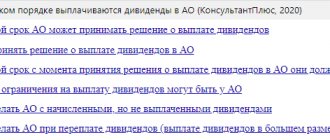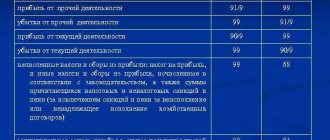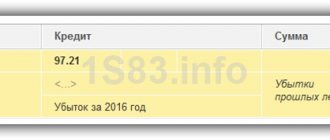A business entity can conduct its business by creating a legal entity. The enterprise can be managed by himself or by a manager hired by the owners. At the same time, the founders can receive income from the company’s activities in the form of dividends, which are paid either from current profits or from the profits of previous years.
To do this, it is necessary to follow the procedure established by law, as well as correctly formulate entries for the payment of dividends to the founder in accounting.
Dividend calculation: postings
Dividends are part of the net profit paid to the participants or shareholders of the company.
The amount of profit to be distributed is determined at the end of the financial year. Its amount is reflected in the final annual entry in the credit of account 84. A decision on such payment can only be made by the general meeting of participants or shareholders of the company. If there is only one founder, then the decision to distribute part of the positive financial result is made only by him.
Settlements with the founders are reflected in account 75 of the chart of accounts. For calculations on the payment of income, the Ministry of Finance in Order No. 94n recommends opening a subaccount 2 for it. Analytical accounting should be kept in the context of each founder. An exception is made for settlements with shareholders - owners of bearer shares in a joint-stock company, since it is impossible to establish their identification data.
Accruals are reflected on the date of the decision to pay part of the company’s undistributed positive financial result to the owners.
Dividends accrued: posting Dt 84 Kt 75.
The payment of income to the founder is reflected by the entry Dt 75 Kt 50, 51.
When are payments made?
The period of time during which dividends must be paid depends on the legal form.
For an LLC, a period of 60 days is established from the date of registration of the minutes of the meeting of participants or the decision of the sole founder. At the same time, the law allows the establishment of a shorter payment period in the company’s charter.
If payment is not made within the specified period, the owner can directly contact the company and demand payment. If even after applying this is not done, you need to go to court.
You might be interested in:
Account 69 in accounting: what is it used for, characteristics, subaccounts, typical transactions
It is advisable to pay dividends to the LLC in non-cash form. There is no direct prohibition on performing this operation in cash, but at the same time, the instructions of the Central Bank do not include a purpose for which cash can be spent, such as issuing dividends.
When paying dividends to the shareholders of a JSC, it is necessary to take into account their status, as well as the moment of determining the recipients. The exact payment terms for each category of shareholders are established in Law 208-FZ. It is allowed to pay dividends to JSC participants only in non-cash form.
In practice, a situation may arise in which dividends will be accrued to the owners, but not paid. However, the statutory payment deadline has already passed.
However, another period has been defined - the limitation period, which lasts three years. It starts counting from the first day after the end of the payment period. The company's charter may also stipulate a longer limitation period, but not more than five years.
If a participant applies for dividends while the statute of limitations has not expired, they must be issued according to the standard procedure with the calculation and withholding of tax. In this case, failure to comply with the payment deadline does not have any negative consequences. But the participant can go to court and collect interest for late payment of the amount.
Important! If the statute of limitations has expired, then the dividends are considered unclaimed. In this case, they are subject to inclusion back in profit, and the obligation to pay amounts to the owner ceases.
Taxation of payments to company participants
From transfers to individuals, the company is obliged to calculate, withhold and transfer personal income tax to the budget (Article 226 of the Tax Code of the Russian Federation). This must be done no later than the next day. The rate for tax residents of the Russian Federation is 13%, for non-residents - 15%.
In relation to part of the profit paid to the organization, it is recognized as a tax agent, that is, it must withhold and transfer profit tax to the budget (clause 3 of Article 275 of the Tax Code of the Russian Federation). Moreover, this rule also applies to enterprises operating:
- on the general taxation system;
- on a simplified taxation system.
The rate, in accordance with paragraphs. 2 p. 3 art. 284 of the Tax Code of the Russian Federation is 13%. The exception is payments to a Russian company that owns at least half of the authorized capital for at least 365 consecutive days before the payment. If the founder is a foreign company, then the rate is 15%. The tax must also be remitted no later than the next day.
How is accrual done?
Dividends represent one of the components of the profit received by the organization, which is redistributed among the founders.
The size directly depends on the share of each participant in the authorized capital or the block of shares owned by one or another founder. Dividends (postings) are accrued directly on the day of distribution of the net profit received.
Dividends are paid (entries are generated in account 84) from retained earnings.
Payments are made on the basis of regulations adopted and approved by the organization. This procedure is agreed upon by all members of the company’s shareholders’ meeting, which is confirmed by an act or decision signed by them. The frequency is determined by law (clause 1 of article 28 14-FZ of 02/08/1998) and happens:
- quarterly;
- semi-annual;
- annual.
Dividends: accrual and payment, accounting entries
Let's look at an example.
By decision of the founders, LLC “Company” pays part of the net profit to three participants on February 15, 2018: JSC “Founder”, Ivanov S.M., Semenov K.S. - each in the amount of 100,000 rubles. All recipients are tax residents of the Russian Federation.
| date | Contents of operation | Sum | Debit | Credit |
| A decision was made to transfer part of the positive financial result to the founders: 100 000 × 3 | 300 000 | 84 | 75 | |
| Personal income tax has been calculated from transfers to individuals: (100 000 × 2) × 13 % | 26 000 | 75 | 68 | |
| Profit tax has been calculated on income to the organization: 100 000 × 13 % | 13 000 | 75 | 68 | |
| Listed by decision on distribution of part of the financial result: 300 000 – 26 000 – 13 000 | 261 000 | 75 | 51 | |
| Withheld personal income tax is transferred to the budget | 26 000 | 68 | 51 | |
| Withheld income tax transferred to the budget | 13 000 | 68 | 51 |
Criteria for recognizing income from participation in other organizations
In accounting, funds received in the presence of other enterprises in the management capital are subject to recognition if a number of conditions are simultaneously met:
- confirmation of the right to accrued payments is an agreement (contract) or other duly executed document;
- the amount of funds received can be determined;
- the result of a specific transaction will be a guaranteed increase in the economic benefits of the organization in connection with the receipt of an asset or the absence of elements of uncertainty in obtaining it.
For your information! The listed criteria must be met at the time of making a decision regarding the direction of dividend payments (for JSC), or from the moment the participants decide on the direction of distribution of net profit (for LLC). When receiving compensation from the end of presence in the LLC, the specified conditions must be met at the time of execution of the participants’ decision on liquidation.
Operating costs for generating income in the form of payment for an extract from the register of members of the company (for inventorying funds invested in the capital of other companies), travel expenses for participation in a shareholder meeting are recognized.
Dividends received: accounting entries
If your company is a member of another organization, then it may be the recipient of dividends. On the date of receipt of such income, the accountant will make the following entries:
- Dt 51 Kt 76 - income received from participation in another company;
- Dt 76 Kt 91 - dividends received are reflected in income.
The received portion of the subsidiary’s undistributed income should be separately reflected in the organization’s financial performance statement on line 2310 “Income from participation in other organizations.”
In tax accounting, it should be borne in mind that income tax has already been withheld from dividends received from a Russian company (clause 3 of Article 275 of the Tax Code of the Russian Federation). Therefore, these revenues do not increase the tax base.
Accounting and taxation of dividends. Founding organizations using the simplified tax system
Legal entities applying the simplified tax system may own shares (interests) in other enterprises and, accordingly, receive income from participation in other organizations. Such income, in particular, includes the amount of part of the profit (dividends) distributed in favor of the organization.
Let's consider the procedure for reflecting income from participation in other organizations, as well as the peculiarities of taxation of this income in the accounting of the founding organization using the simplified tax system.
Let us note that the application of the simplified tax system by founding organizations provides for their exemption from the obligation to pay corporate income tax (with the exception of tax paid on income taxed at the tax rates provided for in paragraphs 3 and 4 of Article 284 of the Tax Code of the Russian Federation), property tax of organizations .
Founding organizations that apply the simplified tax system are also not recognized as payers of VAT, with the exception of VAT payable when importing goods into the territory of the Russian Federation and other territories under its jurisdiction, as well as VAT paid in accordance with Art. 174.1 of the Tax Code of the Russian Federation (clause 2 of Article 346.11 of the Tax Code of the Russian Federation).





